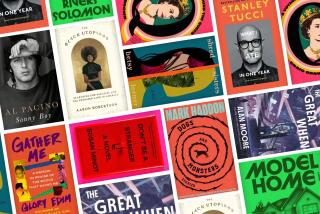Chapter two: Reader closes book for good
- Share via
It’s not like I didn’t try. I did try. I really did. You must believe me.
In fact, I tried repeatedly. But every time I picked up a copy of “Precious Bane,” Mary Webb’s 1924 novel about the travails of a woman named Prue Sarn from rural Shropshire, England, I would get itchy. I would get fidgety. I would get completely bogged down around page 8 or 9. (No, I never made it out of the single digits.) I would let the book fall from my fingers, accompanied by a weary, rueful, so-sorry-about-this sigh, and a quiet spasm of guilt and shame.
Now, “Precious Bane” is a perfectly respectable book. Many people appear to cherish this sturdy, uplifting tale. Indeed, the reason I kept trying to make a go of it is because a graduate school colleague, a sweet woman named Jean, kept pressing it into my hands with an earnest, “You must read this. It changed my life!”
Well, it changed mine too, but not in the way that poor Jean intended. It persuaded me that giving up on a book is one of the most difficult, challenging things we ever do.
Turning the channel when a TV series fails to charm? Exiting a movie theater when the film is a stinker? Slinking out of a theater when the play seems pointless or boring? No problem.
But setting aside a book after you have made the effort to start it? Very, very, very hard.
I am not certain why this is so. We are, by all accounts, a nation with a frantically short attention span; moreover, we don’t mind who knows it. We rather enjoy our reputation for snap judgments and take-no-prisoners critical tastes. Read the comments section of websites dealing with cultural products -- TV shows, movies, magazines -- and you’ll see just how much we love to slash and burn the pastimes that don’t captivate us, how quickly we shoo them away. We love discarding substandard entertainments with the heartless elan of supermodels flinging away personal assistants. We’re tough to please -- and proud of it.
Books, though, are a different story. With books, the social expectation is that -- like a toddler with broccoli -- you will finish what you start, even if you find it hard to swallow. There is an overarching principle at stake. You will honor your commitment. To abandon a book feels all wrong. If you do it, you look around warily, half-expecting to see your middle-school English teacher in the corner, giving you a gravely disappointed glare.
My colleague Maureen, in fact, believes the English Teacher Effect may be at the root of our book guilt: We are implored, from an early age, to finish our homework. Books are equated with homework. Thus, when we don’t finish a book, we are fulfilling our parents’ exasperated prognostication that we are worthless bums who believe the world owes us a living. (And our rooms are a mess too.)
I wonder: As more and more educational functions -- from teaching to textbooks -- go online, will we eventually demonstrate a similar reluctance to log off websites once we feel the onset of restlessness? Right now, of course, most people maneuver that mouse with spastic abandon. Will the Internet ever spark the sort of loyalty that books do, a loyalty so intense that when we betray it, we feel grubby and small? (Forgive me, O “Precious Bane,” for I am weak, and thou art boring.)
But maybe there really is something singular about a tangible object, one that you take into your life and your mind just as much as you take it into your hands. Maybe the emotion engendered by our intersections with those old-fashioned, hopelessly retro things called books--the sense of merging physically as well as spiritually with something larger than ourselves--will show up as well someday in relation to computer screens.
To suggest otherwise -- to speculate that books have a potency that can’t be transferred onto a Kindle (or “the” Kindle, as I have noticed it’s now being called in many quarters) -- is to risk sounding like a doddering old fool, like somebody stuck in 2007. Format is supposed to be flexible, right? Delivery systems are not destiny. Content is king.
And yet I have never regretted turning off a TV show or sneaking out of a movie or play in the same way that I regret not finishing “Precious Bane.” Other books that I never quite finished -- or, to be honest, never came close to finishing -- include “The Golden Bowl” (1909) by Henry James and “Daniel Deronda” (1876) by George Eliot. And not because I don’t like those authors’ styles; I adore James’ “Portrait of a Lady” (1908) and have read Eliot’s “Middlemarch” (1874) multiple times. Certain books just don’t grab you. So you let them go.
But they never really go away, those cast-aside books, because their forlorn covers haunt your sleep. And sometimes, late at night, you could swear you hear them offering a sad little plea: “Can’t we try it just one more time?”
--
Julia Keller is cultural critic at the Chicago Tribune.
More to Read
Sign up for our Book Club newsletter
Get the latest news, events and more from the Los Angeles Times Book Club, and help us get L.A. reading and talking.
You may occasionally receive promotional content from the Los Angeles Times.









